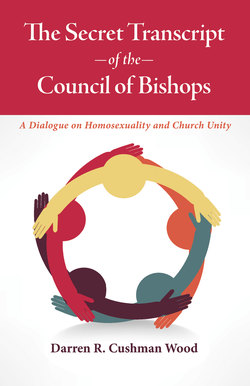Читать книгу The Secret Transcript of the Council of Bishops - Darren Cushman Wood - Страница 6
На сайте Литреса книга снята с продажи.
Introduction
ОглавлениеWhat would Wesley say? United Methodists have always looked to their founder for an example or a quick quote to justify their actions. This dialogue is a little theological exercise to see what insights we might discover in the writings and practices of John Wesley in light of the ongoing debate over homosexuality and its impact on church unity.
Homosexuality raises a host of related questions and issues about ecclesiology. It serves as a good case study to explore how we understand the nature and mission of the church, the meaning of membership, and the role of the episcopacy. Wesleyans have never professed to have an explicit or even coherent understanding of the nature of the church. However, by putting Wesley in the midst of our conversation we may see a better way to understand the church and more loving way to move forward.
This originated as a project for the Pastor-Theologian Program of the Center of Theological Inquiry in 2006. It is also a reflection on my experiences as a delegate to two General Conferences. Over time it became an exercise in listening to the various voices in this debate and their underlying assumptions. It is my hope that there are no straw men in this dialogue but that the complexity of each opinion is honored. Nor is it my intention to align Wesley with a particular side of the debate. Rather, my goal is to listen to the tradition of Wesley in our contemporary context and to put him in conversation with us. We must let the tradition judge us and guide us.
Why write a dialogue? For two reasons. One, the early Methodists did theology in conversation. The first annual conference was a conversation (with John, no doubt, dominating the debate) that expressed their theology in a question-and-answer form that was preserved and passed on in the minutes. This model of theological reflection can still serve us well. Two, the complexity of the issue and the diversity of perspectives warrants this form. A dialogue is the best way to capture the warp and woof of this forty year debate.
To be sure, this is fiction and any resemblance to actual bishops or to any meeting of the Council of Bishops is merely coincidental. But the ideas are all too real. When I read the Wesleys my heart and mind are drawn closer to God. I listen to them, I argue with them, and I submit myself to them. They are my doctrinal standard. I invite the reader to join me in this prayerful conversation with the tradition.
